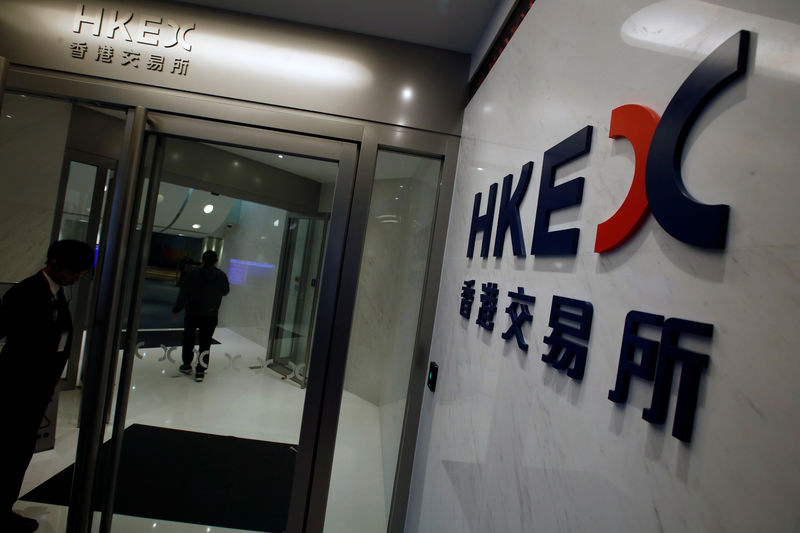This post was originally published on this site
https://i-invdn-com.akamaized.net/news/LYNXNPEC180BO_M.jpg © Reuters. The name of Hong Kong Exchanges and Clearing Limited is displayed at the entrance in Hong Kong
© Reuters. The name of Hong Kong Exchanges and Clearing Limited is displayed at the entrance in Hong KongBy Luoyan Liu and John Ruwitch
SHANGHAI (Reuters) – Chinese investors more than doubled their Hong Kong stocks purchases this year, braving market headwinds from violent street protests and the protracted Sino-U.S. trade war, which have battered the Asian financial hub’s economy.
Data from the Hong Kong Stock Exchange (HKEX) showed mainland investors had been net buyers of Hong Kong stocks for the nine months through to November, as they hunted for bargains in the wobbly $4.5 trillion stock market.
Total net inflows via the Stock Connect linking mainland and Hong Kong in the Jan-Nov period amounted to about HK$208 billion ($26.58 billion), versus about HK$83 billion for the full year of 2018, according to HKEX.
For a graphic on mainland investors bought a total of HK$208 bln HK-listed stocks via Stock Connect in Jan-Nov, click https://fingfx.thomsonreuters.com/gfx/buzzifr/15/2095/2095/Mainland%20investors%20bought%20a%20total%20of%20HK$208%20bln%20HK-listed%20stocks%20via%20Stock%20Connect%20in%20Jan-Nov.png
The months-long protests and their hit to sectors including tourism, retail and real estate have all contributed to the benchmark Hang Seng index’s () global underperformance this year.
For a graphic on Hong Kong economy fell into recession, click https://fingfx.thomsonreuters.com/gfx/buzzifr/15/2094/2094/Hong%20Kong%20economy%20fell%20into%20recession.png
For a graphic on Hong Kong stocks among worst performers in the past six months, click https://fingfx.thomsonreuters.com/gfx/buzzifr/15/2096/2096/Hong%20Kong%20stocks%20among%20worst%20performers%20in%20the%20past%206%20months.png
Mainland investors have been undeterred, though, seeing opportunities to buy on the dip when the overall appetite for risk is dampened and valuations of Hong Kong stocks hover near three-year lows.
For firms dual-listed in mainland China and Hong Kong, the latest AH premium index () indicates Hong Kong-listed shares are more than 20% cheaper on average than their mainland peers.
China’s No. 2 telecom equipment maker, ZTE Corp (HK:) (SZ:), for example, on Wednesday, traded at 31.18 yuan in Shenzhen, while selling at HK$20.9 in Hong Kong, representing a near 40% discount.
For a graphic on Mainland investors continue to buy Hong Kong stocks as valuations hover near 3-yr lows, click https://fingfx.thomsonreuters.com/gfx/buzzifr/15/2204/2204/Mainland%20investors%20continue%20to%20buy%20Hong%20Kong%20stocks%20as%20valuations%20hover%20near%203-yr%20lows.png
Still, there has been a tendency to shun local Hong Kong firms and chase mainland companies whose business operations derive revenue and profits mainly from outside of Hong Kong.
Among mainland investors’ darlings, Chinese food-delivery giant Meituan Dianping (HK:) has seen its share price more than double this year, with upward momentum enhanced by its inclusion in the Stock Connect scheme.
Shares of another consumer bellwether, Haidilao International (HK:), also doubled this year, amid bets Beijing would roll out more measures to spur domestic consumption to shore up growth.
For a graphic on Mainland investors’ Hong Kong darlings outperform in 2019, click https://fingfx.thomsonreuters.com/gfx/buzzifr/15/2209/2209/Mainland%20investors’%20Hong%20Kong%20darlings%20outperform%20in%202019.png
Mainland investors are playing an increasingly significant part in the Hong Kong stock market, owning stakes of 20% or more in several dozen firms.
Analysts believe in the long-run there is still abundant room for their exposure to Hong Kong stocks to keep rising, as their overall holdings are far from dominant and as the listings of tech giants, such as Alibaba (N:) (HK:), boost the offshore market’s attractiveness.

